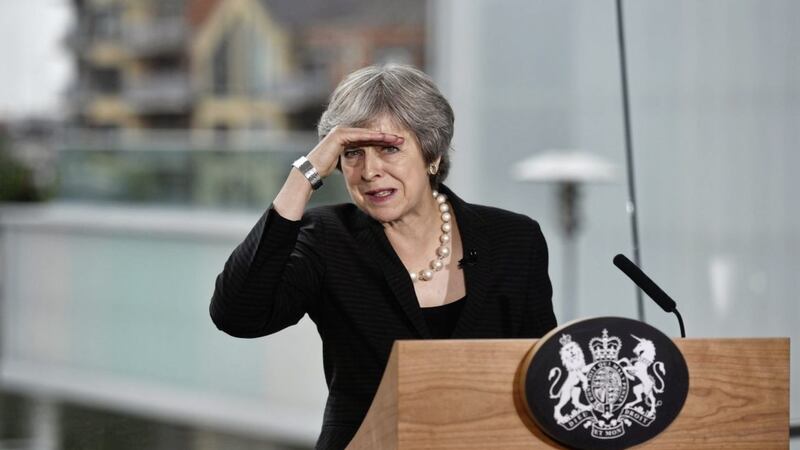THERESA May yesterday reminded her Belfast audience that when she became prime minister just over two years ago she was keen to highlight how the full name of her party was "the Conservative and Unionist Party".
It would perhaps be more appropriate if the Tory leader now re-christened it the Conservative and Democratic Unionist Party, as this would more accurately reflect the expedient alliance that has evolved over the past year since Mrs May's decision to call a snap election backfired and she was forced to strike a confidence and supply deal with Arlene Foster's MPs.
The tie-up is a nice fit in some ways. The DUP bask in any patriotic references that reaffirm an affinity and shared history between this part of Ireland and Britain.
The prime minister yesterday quoted Winston Churchill's post-World War II tribute to the loyal sons of Ulster, without whose help "the light which now shines so strongly throughout the world would have been quenched".
Mrs Foster and her DUP colleague Emma Little-Pengelly, both seated in the front row, beamed accordingly.
Mrs May's speech was also peppered with references to "our union" – one based on the "principle of pooling and sharing our resources" - as opposed to the European Union, which she once strongly advocated membership of but due to circumstances is now forced to malign.
Her address at the Waterfront Hall was clearly crafted with the DUP in mind, and more than just Sinn Féin remarked that it could easily have been penned by Mrs Foster's own speech writer.
However, beyond bigging up their mutual allegiances and attempting to shift responsibility for resolving the Brexit mess further onto the EU, there was nothing remarkable or especially interesting in the British prime minister's words.
If Mrs May managed to hear the genuine deep concern of border communities about the impact of Brexit on their lives and businesses during the previous day's visit to Fermanagh, then it must've come too late for inclusion in her speech, which merely parroted the 'no border in the Irish Sea' line that appears to ignore present arrangements which see livestock and plants coming from Britain checked by officials at ports and airports.
Some even suggested that like Thursday's meetings in Fermanagh, the invited audience in Belfast must have been skewed towards Brexiteers, ensuring a largely positive reception to the prime minister's speech.
Even the questions the Tory leader faced from the media – including the one she invited from a 'John Mansey' from The Irish News – were answered in a scripted manner that more often than not ignored the thrust of what was asked.
While ostensibly Mrs May appeared to be more engaging during her latest visit to the north than on previous occasions, there's a sense that everything she heard – with the exception of the meetings with the other Stormont parties – was benign and upbeat.
Essentially, a complete misreading of what most people in Northern Ireland really think will happen when the UK breaks ties with the EU.







